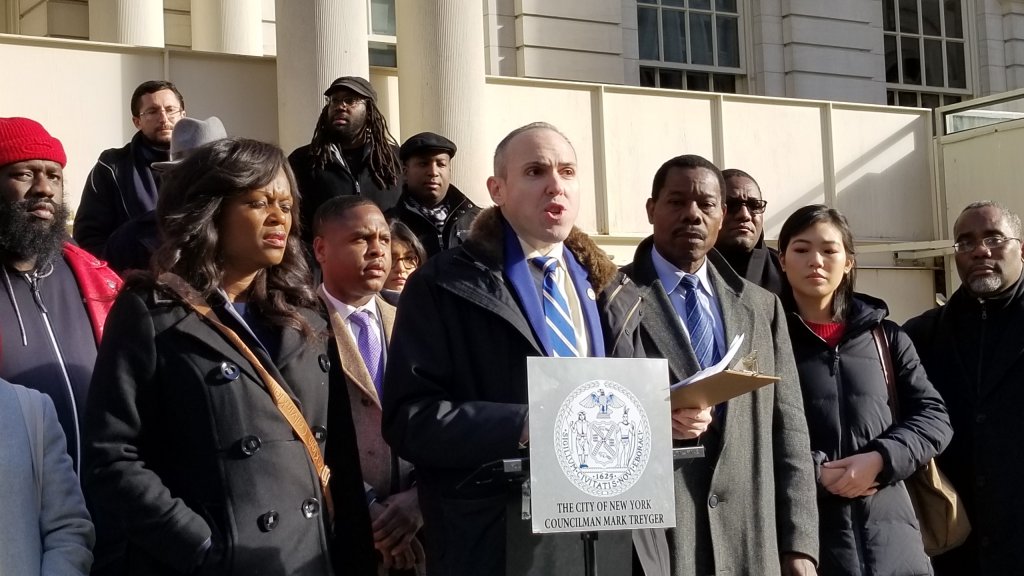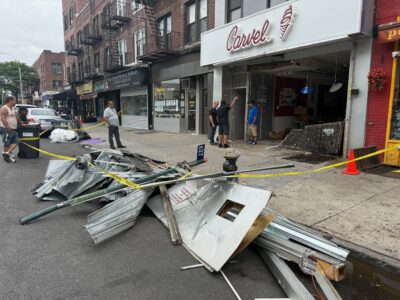Immigration advocates from across the city came out to rally in support of legislation sponsored by Southwest Brooklyn Councilmember Mark Treyger that would put more interpreters in polling stations to provide translation services for non-English speaking voters in elections.
Treyger held a rally outside City Hall on Dec. 5 to call attention to his bill, which would provide interpreters for the 10 most commonly languages in New York City. The translator would be on duty at polling sites where needed.
“Asian American Pacific Islander New Yorkers have historically had some of the lowest voter turnout rates of any immigrant groups, and a huge reason for this is language barriers,” said Carlyn Cowen, chief policy and public affairs officer at the Chinese-American Planning Council, one of the organizations supporting the Treyger bill.
The organizations that have endorsed the proposed legislation include the Arab-American Association of New York, Yalla Brooklyn, Coalition for Asian American Children and Families, New York Immigration Coalition, Asian-American Legal Defense and Education Fund, African Communities Together, Committee for Hispanic Children and Families, Chinese-American Planning Council, Asian-American Foundation and Generation Citizen NYC.
Under the provisions of the federal Voting Rights Act, translation services are made available at polling places in New York City, but only for voters who speak Chinese, Spanish, Korean and Bengali.
That’s not good enough, according to Treyger, who said the net should be widened to include more languages.
His bill would allow the Voter Assistance Advisory Board, a panel that operates under the auspices of the New York City Campaign Finance Board, to dispatch interpreters who speak the 10 most common foreign languages spoken in New York (Russian, Haitian Creole, Arabic, Urdu, French, Polish, Chinese, Korean, Spanish and Bengali) to polling sites.
“In a city where hundreds of languages are spoken, where 40 percent of the population is made up of immigrants, failing to provide adequate language access at polling places is nothing short of voter suppression,” said Treyger, a Democrat whose district includes Coney Island, Gravesend and parts of Bensonhurst.
Treyger introduced his bill at the City Council meeting on Wednesday.
Councilmember Carlos Menchaca, who serves as chairperson of the Committee on Immigration, supports the bill. “Everyone who has the right to vote also has a right to interpretation to help them read and navigate the ballot. This is not rocket science, it’s Democracy 101,” said Menchaca, a Democrat representing Sunset Park and Red Hook.
City Comptroller Scott Stringer said that increasing the number of languages for which translation services are available on Election Day could help improve voter turnout. “If we want to improve New York’s abysmal voter turnout, we must break down as many barriers as possible,” he said.
There has been some non-legislative movement on the issue.
In 2017, Treyger secured funding for a pilot program that placed Russian and Haitian-Creole interpreters at 15 polling sites. This year, working Mayor Bill de Blasio and Council Speaker Corey Johnson, Treyger got the program expanded to 100 polling sites and added Arabic interpreters.
Councilmember Justin Brannan, a Democrat whose district includes Bay Ridge, Dyker Heights and parts of Bensonhurst, has introduced a separate bill that would require the city to have Arabic-speaking interpreters on site at polling places where 50 or more voting-eligible residents with limited English proficiency vote.
Legislation has also been introduced at the state level.
Democratic Assemblymember Steven Cymbrowitz, who represents Sheepshead Bay, sponsored a bill that would require cities with populations of one million people or more to provide Russian translations of ballots and voting materials.
“People who speak Russian, Urdu, Creole and many other commonly-spoken languages have consistently felt unwelcome at the polls and disenfranchised from the voting process. This is insulting and unacceptable, and has been so for a very long time,” Cymbrowitz said.

 Van crashes into Bay Ridge Carvel, two injured
Van crashes into Bay Ridge Carvel, two injured  Cyclones sweep home series to take first
Cyclones sweep home series to take first